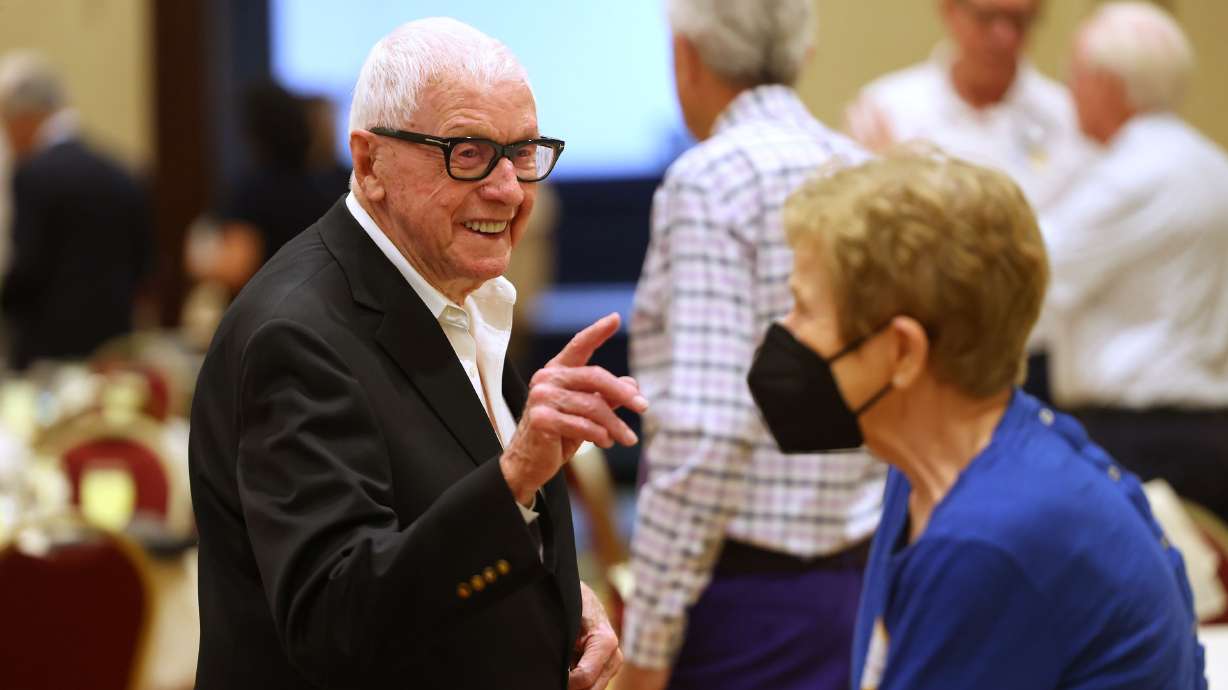Estimated read time: 4-5 minutes
This archived news story is available only for your personal, non-commercial use. Information in the story may be outdated or superseded by additional information. Reading or replaying the story in its archived form does not constitute a republication of the story.
SALT LAKE CITY — It's a little before noon on a Tuesday and Duane Hill is at his post outside the Salon D ballroom at the downtown Marriott Hotel, passing out name badges to fellow members of the Rotary Club of Salt Lake as they arrive for lunch.
The members could just as easily reach in and grab the badges themselves, but that is not the Rotarian way. Their motto isn't "Service Above Self" for nothing.
Rotary has been holding these lunches for more than 111 years, ever since Jan. 31, 1911, when Salt Lake became the 24th such club in existence. No one knew at the time how the idea of a service/social club with no strings to politics, religion or anything else other than the human race would take off. Now there are some 46,000 Rotary Clubs around the world, including 46 in the state of Utah alone. The pioneering Salt Lake club is proud to call itself Club 24.
One hundred and eleven years is older than Duane, who turned 94 this year. He's been a member of Salt Lake Rotary since the 1990s and served as the club's president in 2005. Now he's the luncheon greeter, a task he handles adroitly.
If being greeted by Duane doesn't lift your day, maybe nothing will.
I'm not proud of what brought me here.

I'd been reading about the hard times service clubs and fraternal organizations are going through these days. Social media has not been kind to social clubs. They're not alone, of course. The curse of the internet has struck other long-standing old-school traditions; printed newspapers, to name one. I thought Rotary was in the same kind of shape. And surely the pandemic had only hastened the demise.
I came to write Rotary's obituary.
I expected to see a handful of members, probably pushing walkers, hanging on for dear life.
Turns out, I was wrong. It's true, Rotary's numbers — as with the Masons, Elks Clubs, Lions Clubs, Shriners, et al. — are tumbling, down by 50% or more around the world, and even more than that here at Club 24. Twenty-five years ago, membership exceeded 500. Now it's 160. Weekly lunches that used to routinely host 100 now seat around 30.
But try telling the 27 who showed up to be greeted by Duane, or the 23 who joined via Zoom, that they're a dying breed.
They came to be entertained by a luncheon speech — this one delivered by retired KSL Radio talk show host Doug Wright — and to talk about their ongoing outings and service projects — the picnic tables they're repairing, the trees they're planting.
And that's just for starters. There's the $128,000 they raised over the past year to help resettle Afghan refugees arriving in Utah. There's the ongoing worldwide Rotarian crusade they're a part of to eradicate polio, which is making a mild but disturbing comeback.
"Get polio off the planet entirely," says Jeff Young, Club 24's current president. "Once it's gone it's gone."

There's the ongoing commitment to Cambodian aid, a labor of love for club member Paul Stringham who recruits Rotarians to support his nonprofit, Sustainable Cambodia, that provides educational grants for thousands of Cambodian students in addition to digging wells and helping with other infrastructure needs in the country.
Before Wright stands up and delivers his speech — a rip-roaring call for civility before the country falls apart that plays well with this audience — the day's first speaker is Rachel Finlayson, a BYU graduate who's here to tell the club about the thesis she's writing in graduate school at Oxford University in England — where she's enrolled thanks in no small measure to the $30,000 scholarship contributed by the Rotarians.
Underpinning all this do-gooding is an easy camaraderie around the room, felt but not seen, shared by people who are here because they want to be, not because they're supposed to be.
Maybe back in the day some joined Rotary and attended the weekly lunches because it was a status symbol, or a company requirement, or the place to make contacts and do deals. Not anymore. These are the true believers.
"We may be down in numbers and up in age," says Pearl Wright, Club 24's executive director, "but what's left are the passionate ones."
Like Duane. When asked if he came for the service or the social aspect, he says, "I came for both. And that's why I'm still here."
In his younger days, he used to do more service. Until a few years ago, for example, he was a regular in the Rotary volunteer mentoring program, where Rotarians help tutor school kids.
Duane tells the story of when he realized it was time to move on.
"I was tutoring a sixth grader named Adam at Franklin Elementary," he says. "He'd done a mathematical problem, and I said, 'I think that's wrong.' He said, 'Wanna bet?' I said, 'How much?' He said, '20 bucks.' So we asked the teacher, and Adam was right. I owed him 20 bucks. I stopped tutoring after that."
He says all this with a smile and a twinkle in his eye, a funny, self-deprecating story that tells a lot about Duane and also seems to tell a lot about Rotary.
Service above self. On your own terms. No strings attached.









